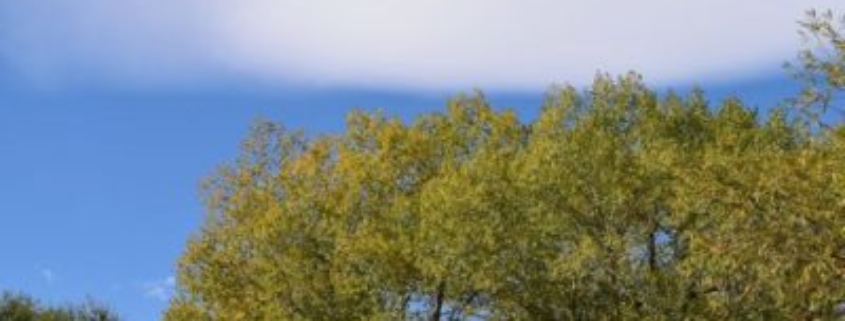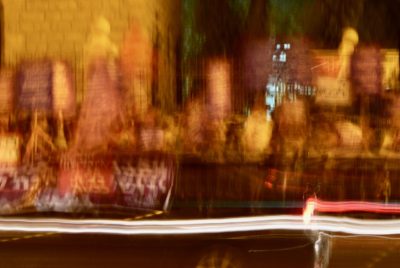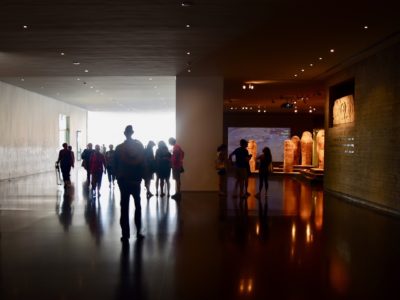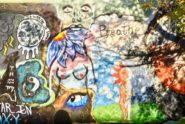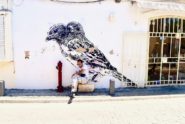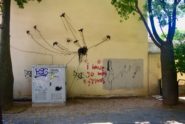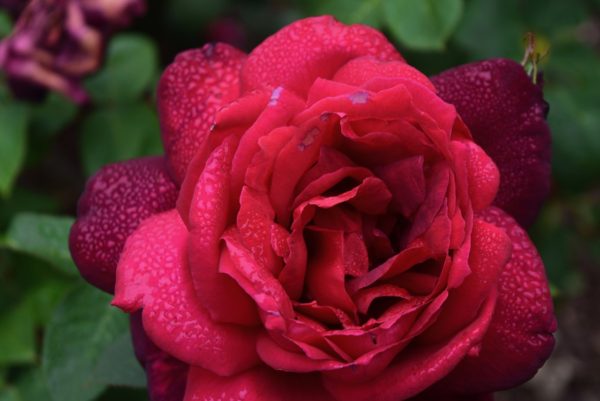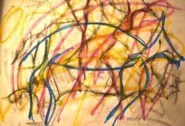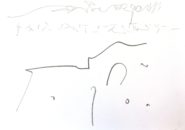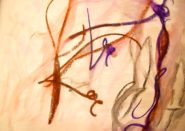Earth Is a Body Who Knows Us
“…frescoes translating
violence into patterns so powerful and pure
we continually fail to ask are they true for us.”
~Adrienne Rich, “The Images”
This essay has been challenging because I’m primarily a poet and visual artist, not used to writing in the first person. It is so much easier and infinitely more satisfying to transcend the concrete details of my life and shoot off into metaphor. But I’ve been challenged to write from an embodied, honest experience. The things that obsess me are so big that to address them here I can only do so in the voices that live inside me, like in a dream where all the people who show up are parts of the Self.
Poems are the interstices of body earth and dream, of song writing and memory, of pictures actions and photographs, of body mind and space, of light compassion and infinity… like the Songs of Milarepa, a Tibetan yogi who lived off nettles and turned green, who cupped his hand behind his left ear to capture the dohas or spontaneous songs that popped out of the atmosphere in his cave, whispered by the dakinis—female sky-dancers, human and nonhuman, who are said to whisper the secrets of dharma into the ears of awakened beings.
The Argument
Voice of Gaia: Inside every body is a sacred text, a living dream-memory of what has transpired and what will transpire, inside the conscious nucleus of earth. But the ozone of memory surrounding our green planet has almost eroded.
Through art, or writing, I can literally make something that never existed. Poetry, from the Greek poiesis, is a made thing. So we are all progenitors of our own making, ancestors to our future selves. I take photographs that, with my memories and dreams, help me make sense of my life.
Inside crumbling Tibetan monasteries of the Gelupa (monastic) sect, today almost destroyed, are elaborate paintings of copulating goddesses and yogis covering an entire cave wall the size of a mountain. These celibate monks devote precious hours and years towards meditating on these postures as an absolute requirement for enlightened, embodied wisdom. At least they have their eyes open.
We have inherited a culture that has turned against the wisdom that lives inside every one of us. This internalized aggression, or self-hatred, has rendered our human body, particularly the female body who is the actual source of all human bodies, into an object of ignorance and fear like a homeland we’ve abandoned postpartum. The unsurprising result is epidemic violence. There is no war, personal or global, holy or profane, that does not destroy earth’s body.
Tibetan tertons or treasure finders, would hide sacred texts, or terma, in parts of nature, such as rivers, a tree, a cave, or even the sky. These literal treasures were hidden for the next terton to discover, sometimes centuries later. These texts were written in code, in a script called dakini writing, which could only be deciphered by other tertons. There is photographic evidence of dakini code.
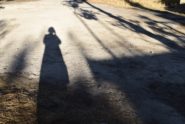 A foundational premise of our culture, the Hebrew Bible, inexplicably lacks a female progenitor or goddess. This has had inevitable and tragic consequences. Sure, mystics and poets have written in her presence, hidden like terma in inaccessible texts. But for those who don’t have the inner resources to rest and breathe into their bodies and access reality, it might not be obvious that this world is a gender fluid paradise.
A foundational premise of our culture, the Hebrew Bible, inexplicably lacks a female progenitor or goddess. This has had inevitable and tragic consequences. Sure, mystics and poets have written in her presence, hidden like terma in inaccessible texts. But for those who don’t have the inner resources to rest and breathe into their bodies and access reality, it might not be obvious that this world is a gender fluid paradise.
So I am suggesting that texts can be planted in our bodies, in our hearts. An example is the Heart Sutra, a Buddhist text which proclaims our inherent inseparability from all phenomena. Sutra, Sanskrit for thread, is a suture. Dreams and memories are also hidden in the body, the earth and possibly the sky-like mind, within clouds, and animals, both real and mythic. I like the notion of placing poems in the body, as sacred receptacles and mnemonic devices. Now ask yourself, “what are the things we need to remember all the time? What five things do we need to keep in our hearts all the time?”
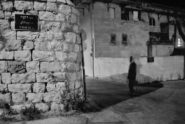 When I’m distracted, or more likely consumed by the ersatz reality of Facebook, I feel disconnected and depressed. Yet this moment is nonetheless beautiful, because while this mud weighs me down, it’s an opportunity to respond creatively to this mess of an illusion called the world. When I sit on earth in my wild body, if I make space for the thoughts and feelings storming through me as I breathe, I encounter an immense inner realm of raw material. From such a perspective, we can all potentially access the unlimited natural resources that makes up who we are and who we become. Unlike the outer world where we live in a shared reality, this inner miracle body of insight is evergreen and pure. But meditation, like writing, it is a solitary activity. How can we bridge that gap, and share the insights we glimpse in this expanded state?
When I’m distracted, or more likely consumed by the ersatz reality of Facebook, I feel disconnected and depressed. Yet this moment is nonetheless beautiful, because while this mud weighs me down, it’s an opportunity to respond creatively to this mess of an illusion called the world. When I sit on earth in my wild body, if I make space for the thoughts and feelings storming through me as I breathe, I encounter an immense inner realm of raw material. From such a perspective, we can all potentially access the unlimited natural resources that makes up who we are and who we become. Unlike the outer world where we live in a shared reality, this inner miracle body of insight is evergreen and pure. But meditation, like writing, it is a solitary activity. How can we bridge that gap, and share the insights we glimpse in this expanded state?
My cousin in Jerusalem is an art-student and activist, who, at twenty-four, is one of my inspirations. She connects with other young Jews and Arabs in and around the city. In small collectives, they drink beer and go on demonstrations. They make films and sit in drum circles. They engage in dialogue amongst themselves and their communities. Some of their protests are fun, despite the godawful circumstances they are protesting.
[one_third]
[/one_third]
[one_third]
[/one_third]
[one_third_last]
[/one_third_last]
Our human minds cannot destroy the space in which we all exist, but the physics seems to be changing. Sometimes it feels like an atom bomb of willful ignorance, of denial, is stirring deep in our collective mind, that even space might contract for our overheated green planet. We have managed to overshadow the sun, eclipsing our own awareness. But going inside we find pure gold, in the shadow of our own body.
This wave of “me toos” feels like a watershed, as women and men speak out about sexual violence and call out the abuses of those with power. Let this floodwater continue to cool us down and clean our shame. Can we all as individuals practice calling out our own power and powerlessness, and listen to each other?
Why we are here
Language hovers in the air
Words in the clouds are birds
Out of the sky a poem
Emerges and disperses
That is why we’re here
To create or destroy
Our own selves, our own names
I am only what you remember of me
Mother is a word, Life is a word
All of it clouds moving through pages
This body of earth and water
Speculative Nonfiction
What if at the end of each year of your life there appeared a single line of text, a retelling or relating, retracing or response, from the year gone by towards the year to come. At the end of one’s life there would be a pamphlet of dreams, decisions, derivations, drivel, and daemonic acts. At the end of one’s life, whether in poetry or prose, the resulting book would live in a library, bound and archived between strong materials, etched or carved in letters inlaid with gold-leaf, bearing a simple title: My Life, with your name below it.
Chapter one would not be filled with earliest memories or a historical accounting of baby achievement. It would begin with a small poem to set the philosophical tone for a collection of primary wounds and wonders, and forgotten regrets. There’d be a chapter full of place names, approximating furniture or architecture that buttress a life, in a world empty of people, like a map empty of towns. Only the roads would show, interwoven between lakes and mountains, like a drawing from space, an abstract sketch done by a skygod.
A chapter would tell a story of the dawning of consciousness, a circular tale that could begin anywhere and end anywhere, or nowhere. This chapter would reveal and conceal the integrity of emptiness, chaos, infinity, and love, with many footnotes denoted by tiny icons of actual feet. This would be the chapter of particulars, of who you are in a parallel reality both inside earth’s core and beyond the farthest reaches of space, as your body.
Turning this book upside down would reveal a hidden script in the spaces around and between words, (like a Torah scroll written with black and white fire and water) discernable only with squinted eyes or glasses that purposely blur. This script would be composed of abstract sketches of the movement of feelings in a headless text, like alphabets that go mad off the page and become living electric lines spelling out codes (like Aboriginal mulga lines sung in the Outback).
And so it is with every life, at the end we will leave our writing on pages of, beaches, fields, forests, and mountains. On earth’s skin.
[one_third]
[/one_third]
[one_third]
[/one_third]
[one_third_last]
[/one_third_last]
Prayer for my Mother
One day is a unit of time, a stretch of hours that lives in an open sky
One day is an abstract noun or a dream of peace
One day all that is will be gone except that love you planted and tended in your own body
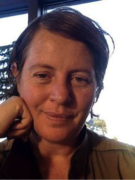 Gillian Reingold is a Kundalini Yoga Therapist and artist based in Boulder. She is an MFA candidate in poetry at Antioch University Los Angeles, and the visual art co-editor at Lunch Ticket. She spent the last semester exploring the genre of “visual poetry” at Antioch University Santa Barbara. She divides her time between the two hemispheres.
Gillian Reingold is a Kundalini Yoga Therapist and artist based in Boulder. She is an MFA candidate in poetry at Antioch University Los Angeles, and the visual art co-editor at Lunch Ticket. She spent the last semester exploring the genre of “visual poetry” at Antioch University Santa Barbara. She divides her time between the two hemispheres.

